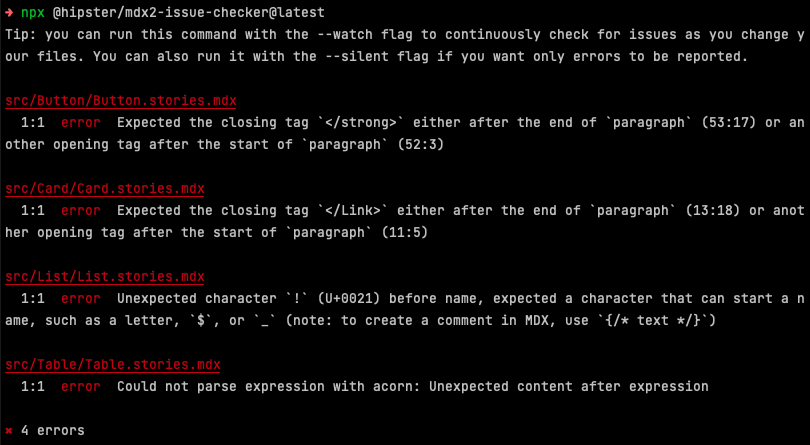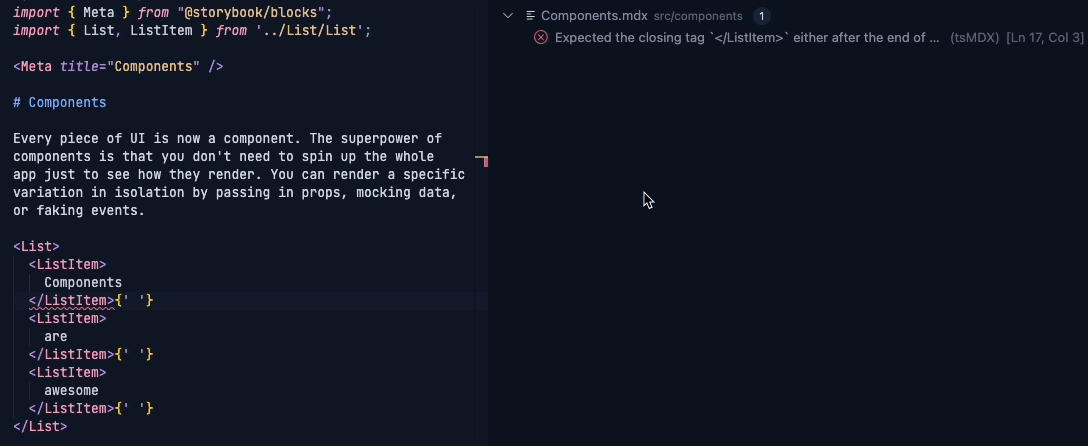Storybook 7 is our first major release in over 2 years. A lot has changed during that time, so this is a big one. This guide is meant to help you upgrade from Storybook 6.x to 7.0 successfully!
Major breaking changes
The rest of this guide will help you upgrade successfully, either automatically or manually. But first, we’ve accumulated a lot of breaking changes in Storybook 7. Here are the most impactful changes you should know about before you go further:
- Webpack4 support discontinued
- IE11 support discontinued
- Minimum supported version of node is 16
- Babel mode v7 exclusively
- Start and build CLI binaries removed
- Some community addons might not work yet
If any of these apply to your project, please read through the full migration notes before continuing. If any of these new requirements or changes do not fit your project, you should probably stick with Storybook 6.x.
Automatic upgrade
To upgrade your Storybook:
This will:
- Upgrade your Storybook dependencies to the latest version
- Run a collection of automigrations, which will:
- Check for common upgrade tasks
- Explain the necessary changes with links to more information
- Ask for approval, then perform the task on your behalf
To add Storybook to a project that isn’t currently using Storybook:
This will:
- Figure out which renderer (React, Vue, Angular, Web Components), builder (Webpack, Vite), or meta-framework (Next.js, SvelteKit) you’re using
- Install Storybook 7 and auto-configure it to mirror project settings
Manual migrations
In addition to the automated upgrades above, there are manual migrations that might be required to get Storybook 7 working in your project. We’ve tried to minimize this list to make it easier to upgrade. These include:
- Upgrade MDX1 to MDX2
storiesOfsupport discontinued by default
Upgrade MDX1 to MDX2
Storybook 7 uses MDX2 by default for rendering docs. The upgrade from MDX1 to MDX2 is not fully automated, due to the large number of changes between versions. Fortunately, we have some tips to help make it a lot easier.
Automatically detect MDX2 errors with a CLI tool
If your project contains MDX files, run the following command before starting up Storybook:
This will go through every MDX file in the current working directory, and show you which files have errors:

Fix MDX2 errors iteratively
The CLI only shows the first error per file, so you might need to run the checker iteratively. One way to streamline this process if you use VS Code is to:
- Install the MDX VS Code extension
- Enable experimental IntelliSense support for MDX files in your user settings:
"mdx.experimentalLanguageServer": true
This shows the errors visually in your editor, which speeds things up a lot. Here's what it looks like to fix multiple errors in a file using the extension:

MDX1 as fallback
If, for some reason, you are unable to get MDX2 working, we’ve implemented legacy MDX1 support as a last resort. MDX1 is deprecated and opt-in, and we recommend against it unless you really need it.
To use MDX1:
- Install
@storybook/mdx1-csfas a dev dependency - Add the
legacyMdx1feature flag to your.storybook/main.js:
storiesOf support discontinued by default
If you use Storybook’s legacy storiesOf API, it is no longer supported by default in Storybook 7.
We recommend you upgrade your storiesOf stories to Component Story Format (CSF). To do so, please see our optional migration instructions below.
If you can’t upgrade to CSF, or want to get your project working with Storybook 7 before putting in the time to upgrade, you can opt out of on-demand story loading. This legacy mode has a variety of performance implications, but is a convenient stop-gap solution.
To opt out, add the storyStoreV7 feature flag in .storybook/main.js:
For more information on this change, see the migration notes.
Troubleshooting
The automatic upgrade should get your Storybook into a working state. If you encounter an error running Storybook after upgrading, here’s what to do:
- If you’re running
storybookwith thedevcommand, try using thebuildcommand instead. Sometimesbuilderrors are more legible thandeverrors! - Check the full migration notes, which contains an exhaustive list of noteworthy changes in Storybook 7. Many of these are already handled by automigrations when you upgrade, but not all are. It’s also possible that you’re experiencing a corner case that we’re not aware of.
- Search Storybook issues on GitHub. If you’re seeing a problem, there’s a good chance other people are too. If so, upvote the issue, try out any workarounds described in the comments, and comment back if you have useful info to contribute.
- If there’s no existing issue, you can file one, ideally with a reproduction attached. We’ll be on top of Storybook 7 issues as we’re stabilizing the release.
- If you prefer a more interactive medium, try out the
#prereleaseforum in the Storybook Discord. We have Storybook maintainers and a large community of users who should be able to give you a hand.
If you prefer to debug yourself, here are a few useful things you can do to help narrow down the problem:
- Try removing all addons that are not in the
@storybooknpm namespace. Community addons that work well with 6.x might not yet be compatible with 7.0, and this is the fastest way to isolate that possibility. If you find an addon that needs to be upgraded to work with Storybook 7, please post an issue on the addon’s repository, or better yet, a PR to upgrade it! - Another debugging technique is to bisect to older prerelease versions of Storybook to figure out which release broke your Storybook. For example, assuming that the current prerelease of Storybook is
7.0.0-beta.56, you could set the version to7.0.0-alpha.0in yourpackage.jsonand reinstall to verify that it still works (alpha.0 should be nearly identical to6.5.x). If it works, you could then try7.0.0-beta.0, then7.0.0-beta.28and so forth. Once you’ve isolated the bad release, read through its CHANGELOG entry and perhaps there’s a change that jumps out as the culprit. If you find the problem, please submit an issue or PR to the Storybook repo and we’ll do our best to take care of it quickly.
Optional migrations
In addition to the automigrations and manual migrations above, there are also optional migrations that you should consider. These are things that we’ve deprecated in Storybook 7 (but remain backwards compatible), or best practices that should help you be more productive in the future.
These include:
- Upgrade to Component Story Format v3 (CSF3), the latest iteration of our example format
- Upgrade from the legacy storiesOf API to Component Story Format
- Upgrade from
.stories.mdxfiles to pure MDX and Component Story Format - Upgrade from Storybook 6 recipe “CSF stories with arbitrary MDX”
CSF2 to CSF3
We published a detailed post about CSF3 including all of its benefits and migration steps.
If you want to just skip to the migration, we provide a codemod for your convenience which should automatically make the code changes for you (make sure to update the glob to fit your files):
storiesOf to CSF
Storybook 7's architecture is focused on performance and needs code that is statically analyzable. For that reason, it does not work with storiesOf. We provide a codemod which, in most cases, should automatically make the code changes for you (make sure to update the glob to fit your files):
.stories.mdx to MDX+CSF
Storybook 7 provides a cleaner docs that defines manual documentation in pure MDX and stories in CSF, rather than the previous .stories.mdx hybrid approach, which is now deprecated. You can automatically convert your files using the following codemod (make sure to update the glob to fit your files):
You’ll also need to update your stories glob in .storybook/main.js to include the newly created .mdx and .stories.js files if it doesn’t already.
NOTE: this migration supports the Storybook 6 “CSF stories with MDX docs” recipe.
Storybook 6 recipe “CSF stories with arbitrary MDX”
Storybook 6 had a second recipe, “CSF stories with arbitrary MDX”. This recipe is still supported in Storybook 7, but the new recommendation is cleaner & more future proof. Upgrade manually using the following example:
Before
After
Your MDX files should be updated to reference the CSF story export, which is safer and cleaner than referencing the string ID:
You should also remove the MDX imports from your story files:
Finally, you’ll need to add the MDX files to .storybook/main.js so that they are indexed:
